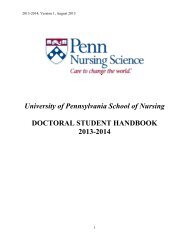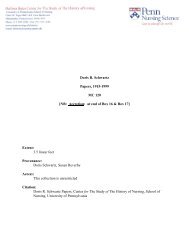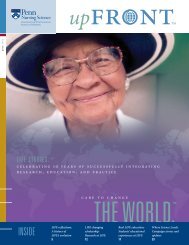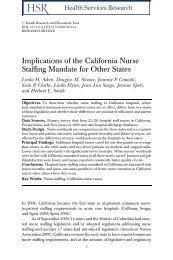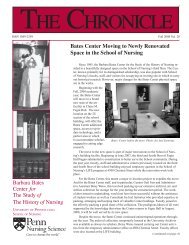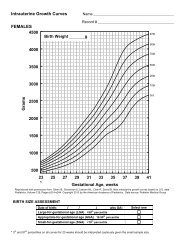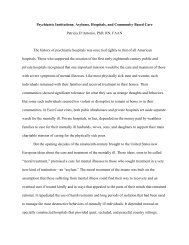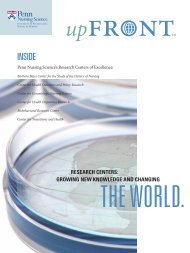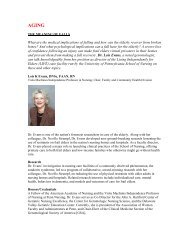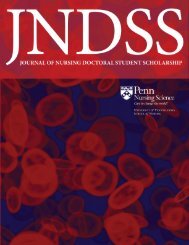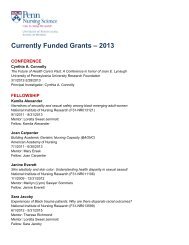10 Landmark Nursing Research Studies - National Institute of ...
10 Landmark Nursing Research Studies - National Institute of ...
10 Landmark Nursing Research Studies - National Institute of ...
You also want an ePaper? Increase the reach of your titles
YUMPU automatically turns print PDFs into web optimized ePapers that Google loves.
The health care team taught all <strong>of</strong> the study participants about the<br />
benefits <strong>of</strong> HBP control, and all received free annual check-ups.<br />
Half <strong>of</strong> the men, serving as the control group, received referrals to<br />
community health care sources for ongoing HBP care. The rest<br />
were enrolled in the HBP team intervention. The health care team<br />
consisted <strong>of</strong> a nurse practitioner, a community health worker and<br />
a physician consultant. The team provided free antihypertensive<br />
medications and follow-up care, ongoing assessments, home visits,<br />
and referrals to social services and job training.<br />
At the conclusion <strong>of</strong> the study, men in both the control and the<br />
intervention groups showed decreases in smoking and consumption<br />
<strong>of</strong> salty foods. However, the men in the HBP team intervention<br />
showed a significant decrease in their systolic and diastolic pressures,<br />
with 44% lowering their blood pressure to within the normal range,<br />
and fewer signs <strong>of</strong> heart and kidney damage. They also reported more<br />
regular use <strong>of</strong> health care services and antihypertensive medications<br />
than the control group.<br />
Implications<br />
According to Dr. Hill, no previous hypertension studies had targeted<br />
high-risk, young urban black men, who are frequently underserved<br />
by the health care system. Participation in this study was the first time<br />
many <strong>of</strong> these men had come into contact with formal health care.<br />
They were pleased to be part <strong>of</strong> the research and to improve their<br />
health. By establishing a lasting, trusting relationship with these at-risk<br />
men, the health care team encouraged them to make lifestyle changes<br />
and maintain medication regimens that helped to improve their<br />
management <strong>of</strong> HBP.<br />
Dr. Hill said, “We used a comprehensive health care team approach<br />
with these men, who are considered hard to reach. The team approach<br />
was key to achieving control <strong>of</strong> hypertension and to retaining more<br />
than 90% <strong>of</strong> these men in the study protocol over three years’ time.”<br />
Reference<br />
Hill MN, Han H, Dennison CR, Kim MT, Roary MC, Blumenthal RS,<br />
Bone LR, Levine DM, and Post WS. (2003). Hypertension care and control<br />
in underserved urban African American men: behavioral and physiologic<br />
outcomes at 36 months. American Journal <strong>of</strong> Hypertension, 2003; 16: 906-913.<br />
12 <strong>National</strong> <strong>Institute</strong> <strong>of</strong> <strong>Nursing</strong> <strong>Research</strong>





